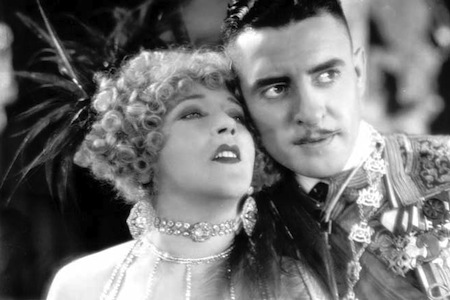Born: July 10, 1895, Logan, UT
Died: January 9, 1936, Los Angeles, CA
His absolute disregard for the powers of the studio has all but wrecked his career.
—Louella Parsons
In the late 1920s, John Gilbert was the screen’s greatest idol, appearing in one hit after another. Following the death of the legendary Rudolph Valentino, Gilbert was being groomed by Metro-Goldwyn-Mayer to replace him in macho adventures and bedroom dramas. An article of the day in Cinema Art magazine proclaimed that “John Gilbert stands alone at the topmost pinnacle of film fame. There is no one who can approach him.” He was receiving gushing praise, collecting $10,000 a week, and romancing a modern-day goddess. Then, after a row with MGM boss Louis B. Mayer during a cocktail party, Gilbert was cast out of the picture business forever. The event signaled a major shift from an industry dominated by powerful stars to an industry controlled by studio heads. Mayer used John Gilbert to effectively demonstrate the ease with which he could destroy an actor’s career.
Gilbert’s sudden and complete excommunication from the film industry shocked his fellow actors, who immediately speculated as to the real reasons behind his troubles. Stories started to circulate about the fateful night Gilbert attacked Mayer. Rumors began about his voice tests for sound movies. Gossip columnists shared their thoughts on his absence from the screen. Actors paid close attention to the news of Gilbert’s subsequent heavy drinking and destitution. Then, the March 20, 1934 issue of Hollywood Reporter was published, featuring an ad placed by Gilbert himself that shamelessly declared: METRO-GOLDWYN-MAYER WILL NEITHER OFFER ME WORK NOR RELEASE ME FROM MY CONTRACT! The power shift in Hollywood was complete.
The downhill slide of Gilbert was the steepest of any actor in film history. Having acted on the stage under the name John Pringle, he broke into films in 1915 through his family’s connections and was billed as “Jack” Gilbert for his first bit part, in the Thomas Ince production Matrimony (1915). He starred opposite Mary Pickford in Heart o’ the Hills (1919), then in a string of action adventures that got him a contract with William Fox. He was prominently marketed as a dashing swashbuckler in such films as Monte Cristo (1922). His status as a budding screen idol grew with each picture.
His blockbusters came at the close of the silent era and included He Who Gets Slapped (1924), The Big Parade (1925) and The Merry Widow (1925), a smash hit and a boon to his clout as a Hollywood star. By the time he teamed with Greta Garbo in Flesh and the Devil (1927), he was MGM’s hottest property, demanding bigger pay and better roles. His heated romance with Garbo made their pairings in Love (1927) and Woman of Affairs (1928) eagerly anticipated events and international hits. Gilbert’s real-life infatuation with Garbo is often credited with bringing forth her on-screen sex appeal.
Contrary to rumors that the fabled romance had fueled Mayer’s dislike of Gilbert, the two men had clashed several times before Greta Garbo entered the picture. Mayer’s puritan upbringing made him uneasy with Gilbert’s unflagging infidelities and his coarse manner. An unfortunate incident at an MGM production office one day found Mayer questioning whether Gilbert’s mother had been married before his birth; Irving Thalberg and a bodyguard were required to restrain the two men. Following that, Thalberg kept the peace between his vindictive boss and his most popular star.
As the affair with Garbo turned sour, Gilbert and Mayer found more opportunities to argue. An exchange between them at the wedding of King Vidor to Eleanor Boardman on September 8, 1926, set off one of the most bizarre incidents in Hollywood’s history. To spite Gilbert, Garbo had become engaged to another man and had asked Metro chief Louis B. Mayer to break the news to the doting Gilbert at the reception dinner. There, in a heated discussion, Gilbert viciously attacked Mayer, hitting him in the face. In front of a roomful of movie stars and producers, Mayer, enraged, threatened to ruin Gilbert’s career.
For the next several weeks, Thalberg attempted to act as a buffer again, telling Gilbert that he should cling to the terms of his contract and that Mayer would eventually relent. When Mayer tried to renegotiate Gilbert’s weighty $250,000-per-picture contract, Gilbert refused to budge, insisting that MGM live up to its agreement. Then, Mayer simply declined every proposed project with Gilbert’s name on it, claiming his salary was a budget-killer. After Thalberg convinced Mayer to allow a sound debut for Gilbert to utilize his talents, Redemption (1930) became the star’s first talkie. However, Mayer delayed its release for a year, sending rumors around town that the recordings of Gilbert’s voice made the film laughable. In its place, Mayer agreed to send out His Glorious Night (1929), a film that was badly edited and poorly recorded. He then assigned Gilbert to roles requiring foreign accents. Reviews were not bad, but grosses sank and the trade papers began to eulogize Gilbert prematurely. Alleging that Gilbert’s vocal qualities were unsuitable for sound films (an exaggeration of enormous proportions), Mayer fired him.
The advent of sound films ushered in a new generation of actors who didn’t have to combat silent stereotypes, and there was little hope for a reversal of Gilbert’s declining fortunes. Garbo attempted to help him with a role in Queen Christina (1933) and Marlene Dietrich campaigned for his inclusion in The Garden of Allah (1936). He drank himself into depression and became something of a village idiot, lumbering around sets, looking up old costars, all the time reminiscing and bellyaching about his dire financial future. Literally drinking himself into poor health, John Gilbert died of a massive heart attack in 1936. He was only forty-one years old.
The demise of John Gilbert’s career is now so clouded in legend that separating the cause from the effect is critical to an understanding of his place in Hollywood history. It is clear that before the wedding scuffle, Gilbert was at the height of his popularity. His pictures were breaking attendance records, and many of his five-year-old films had been re-released internationally by William Fox to full houses and enormous grosses. But despite Gilbert’s unforgettable charm, no producer dared to recruit him. Gossip columns clung to the story of his high, squeaky pitch, and some guessed his misfortune was a result of the downfall of romantic silent dramas, but the point was bell-ringing clear to other actors—the studio heads had demonstrated that they had the power to make stars and to ruin careers at will. Gilbert was the most compelling example yet of how studio heads had turned the tables on powerful stars. The film industry would no longer be ruled by the force of its creative talent, but instead by a system of managers and executives who would determine all aspects of filmmaking—a system that has remained a permanent part of Hollywood since the tragic end of John Gilbert’s career.
To read all the republished articles from ‘The Film 100,’ go to Reintroducing the Film 100 here on Keyframe.





